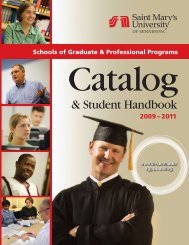PDF version - Saint Mary's University of Minnesota
PDF version - Saint Mary's University of Minnesota
PDF version - Saint Mary's University of Minnesota
You also want an ePaper? Increase the reach of your titles
YUMPU automatically turns print PDFs into web optimized ePapers that Google loves.
Biology<br />
B322 Developmental Biology 3 credits<br />
A study <strong>of</strong> mostly animal development from genetic and molecular perspectives. A brief account <strong>of</strong><br />
embryology is followed by gametogenesis, fertilization, embryogenesis, and organogenesis. All<br />
topics are covered with emphasis upon differentiation. Class meets weekly for three hours <strong>of</strong> lecture/<br />
discussion. Offered in alternate spring semesters. Prerequisites: B110/111, B120/121, and B310.<br />
B323 Plant Communities and Taxonomy with Laboratory 3 credits<br />
A course that combines collection and identification <strong>of</strong> local terrestrial and aquatic plants with a survey<br />
and analysis <strong>of</strong> plant communities. Two lectures and one laboratory period or field trip per week.<br />
Offered fall semester. Prerequisites: B110/111, B120/121 and B301.<br />
B340 Limnology with Laboratory 4 credits<br />
Lecture emphasis is placed on physical and chemical principles and their interpretation. Attention is<br />
given to taxonomy, adaptations, distributions and abundance <strong>of</strong> organisms. Lab and field studies<br />
emphasize techniques and aquatic environmental assessment. Three hours <strong>of</strong> lecture/discussions and<br />
one three-hour lab/field study weekly. Offered spring semester. Prerequisite: B301.<br />
B350 Heredity and Society 3 credits<br />
This course is open to non-biology majors only. In-depth coverage and discussion <strong>of</strong> topics that show<br />
how many <strong>of</strong> the contemporary social problems are related to the basic concepts <strong>of</strong> heredity. Some <strong>of</strong><br />
the relevant bio-social problems considered are human reproduction, carcinogens, mutagens, genetic<br />
syndromes, chromosome abnormalities, aging, inbreeding, the genetic basis <strong>of</strong> behavior, genetic<br />
engineering, genetic screening, genetic counseling, and bioethics. The course meets for three lectures<br />
weekly. Offered spring semester.<br />
B370 International Experience in Field Biology 3 credits<br />
This course involves the study <strong>of</strong> the ecology <strong>of</strong> another country. A series <strong>of</strong> lectures on natural history,<br />
ecological communities and environmental issues is followed by a guided study tour to allow students<br />
to observe firsthand the landscapes, culture and wildlife <strong>of</strong> the region. This course is <strong>of</strong>fered in the<br />
summer only. A travel fee for the study tour is required. Prerequisite: B301.<br />
B371 Ornithology with Laboratory 3 credits<br />
This course examines birds from aspects <strong>of</strong> ecology, behavior, taxonomy, physiology, and identification.<br />
Two one-hour lecture/discussion sessions and one three-hour lab/field trip each week. Offered in<br />
alternate fall semesters. Prerequisite: B301.<br />
B375 Natural History Field Trip 1-2 credits<br />
This course combines lectures and a study tour to examine geological features and ecological<br />
communities in a selected region within the continental U.S.A. that is accessible during a 7-10 day<br />
trip (e.g., the Ozark Mountains or the Everglades). The class may stay at campgrounds or other rustic<br />
accommodations during the trip. A travel fee for the study tour is required. Prerequisite: B301.<br />
B380 Earth Science with Laboratory 3 credits<br />
This lecture and lab course introduces students to the Earth’s dynamic systems. An overview <strong>of</strong><br />
physical geology is first presented. The class then examines specific processes <strong>of</strong> erosion, transport<br />
and deposition and the resultant land forms that are produced. Other geomorphological processes are<br />
also discussed. Throughout, emphasis is placed on the inter-relatedness <strong>of</strong> these processes, and how<br />
they may impact and be altered by humans. Two lectures and one three-hour lab per week. Offered in<br />
alternate fall semesters.<br />
B384 Pollution Ecology with Laboratory 3 credits<br />
This course involves an examination <strong>of</strong> major pollutants and their sources; ecological, health, and<br />
economic effects; and control technology. Class sessions emphasize industry, transportation, agriculture<br />
63 63
















